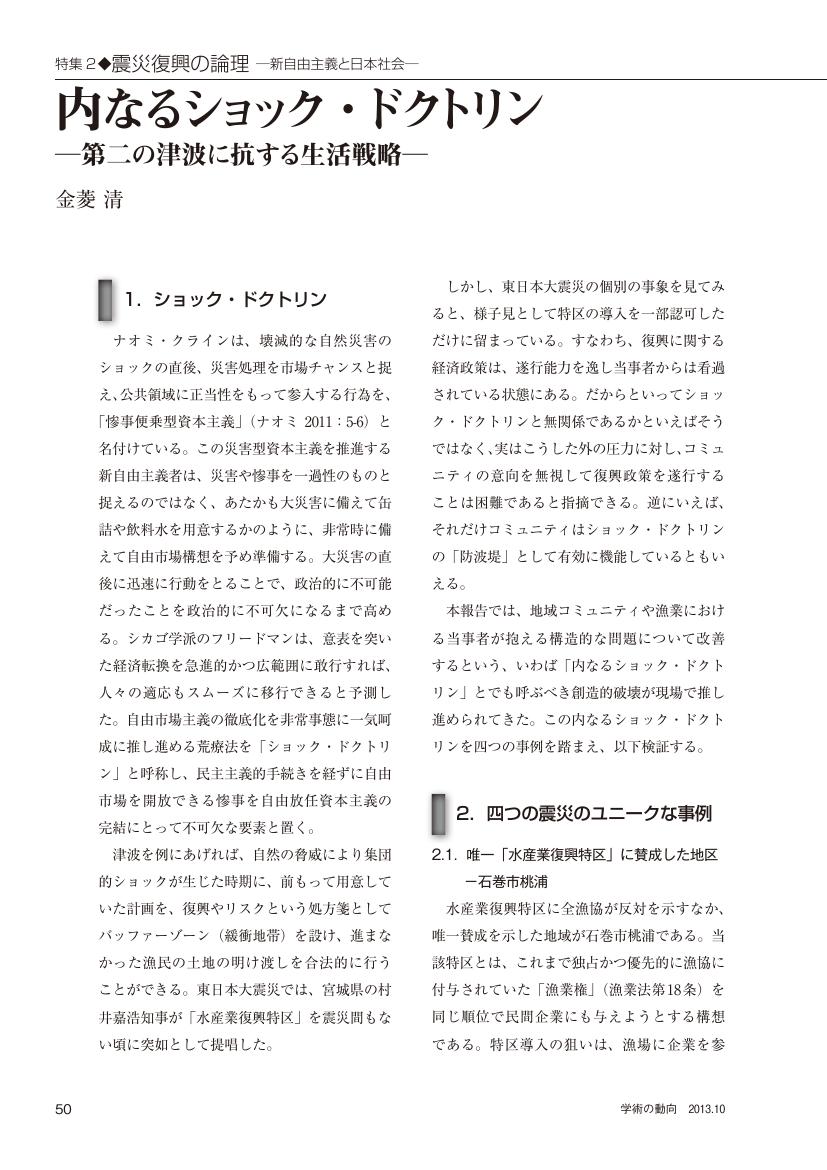150 0 0 0 OA 開沼博著『「フクシマ」論――原子力ムラはなぜ生まれたのか』
- 著者
- 金菱 清
- 出版者
- 日本社会学会
- 雑誌
- 社会学評論 (ISSN:00215414)
- 巻号頁・発行日
- vol.63, no.4, pp.631-633, 2013-03-31 (Released:2014-03-31)
4 0 0 0 OA 内なるショック・ドクトリン
- 著者
- 金菱 清
- 出版者
- 公益財団法人 日本学術協力財団
- 雑誌
- 学術の動向 (ISSN:13423363)
- 巻号頁・発行日
- vol.18, no.10, pp.10_50-10_53, 2013-10-01 (Released:2014-02-07)
- 参考文献数
- 6
3 0 0 0 OA 災害リスクの“包括的制御”
- 著者
- 金菱 清 植田 今日子
- 出版者
- 日本社会学会
- 雑誌
- 社会学評論 (ISSN:00215414)
- 巻号頁・発行日
- vol.64, no.3, pp.386-401, 2013 (Released:2014-12-31)
- 参考文献数
- 15
- 被引用文献数
- 1 3
本稿の目的は, 宮城県の各被災地の人びとの営みから, 排除することのできない災害リスクを抱えながら生活を再構築していく技法に学ぶことで, 災害リスクへの適応実践のあり方を示すことにある.今回の東日本大震災でとりわけ津波の被害が甚大であった現場で見えてきた災害との向き合い方の方向性は, 大きくは2つある. 1つは, 被害の大きかった場所から撤退したり, 津波による物理的損失を未然に防ぐことで日常生活に支障をきたさない状況を目指す方向性である. もう1つは, 生活をともにするコミュニティの維持・継続を目指した先に, 物理的なダメージの緩衝のみならず被災後も派生してくる生活困難や孤立, 精神的ダメージといった複合的な災害リスクを包括的に低減することを目指す方向性である. 後者の方向性のあり方を, 本稿では「災害リスクの包括的制御」と呼んでおきたい.災害リスクと向き合うとき, 災害パターナリズムによる災害リスクへの対処法は, 結果としてリスクの締め出しと引き換えに生活弱者を生み出すのも致し方なしという社会的排除の性格を強く帯びる. それに対し, 本稿が提示するコミュニティに備わる災害リスクの包括的制御は, もっとも不利な人が生きていくための社会的セイフティネットの役割をもつ. 事後的にしか対処できない派生的な被災の実態に対して, 包括的制御アプローチは, 災害発生時のみならず災害後も居座り続ける複合的な災害リスクを縮減することに寄与していることを実証する.
2 0 0 0 OA ライティング・ヒストリーの展開 ―オーラル・ヒストリーの敗北宣言―
- 著者
- 金菱 清
- 出版者
- 関西社会学会
- 雑誌
- フォーラム現代社会学 (ISSN:13474057)
- 巻号頁・発行日
- vol.17, pp.137-148, 2018 (Released:2019-05-11)
- 参考文献数
- 9
ライティング・ヒストリーは、調査者の介在を必要としながらもその関与を無効にし、当事者のなかで抑圧されていた無意識に対して、当事者が自らの手で意味のある「歴史」として刻むことができる新たな実践です。現場の当事者は、こんなことを話すべきではない、書くべきではないという形で感情を抑圧している場合があります。いわゆる沈黙状態です。それを二人称で亡き人に対して「手紙」という形で書き記してもらいます。予め書かれたものがあってそれを分析するといった書かれた(written)文章資料主義ではなく、書こうとする(writing)意思に重点を置きます。ライティング・ヒストリーは、自分でわけのわからないぐちゃぐちゃしていた感情を自分のなかで咀嚼しながらなんとかそれを理解可能なものへと導いてくれます。そのことで、これまで歴史のなかで沈黙を強いられてきた問題が何であるのかを明らかにする試みです。
2 0 0 0 OA 「社会情報学からみた場所と移動」
- 著者
- 三浦 伸也 吉原 直樹 金菱 清 金 成玟 伊藤 昌亮 遠藤 薫
- 出版者
- 一般社団法人 社会情報学会
- 雑誌
- 社会情報学 (ISSN:21872775)
- 巻号頁・発行日
- vol.6, no.1, pp.33-68, 2017 (Released:2017-11-16)
2 0 0 0 呼び覚まされる霊性の震災学 : 3.11生と死のはざまで
- 著者
- 東北学院大学震災の記録プロジェクト金菱清(ゼミナール)編
- 出版者
- 新曜社
- 巻号頁・発行日
- 2016
1 0 0 0 OA 幽霊と夢のナラタージュ 東日本大震災の〈いまはむかし〉
- 著者
- 金菱 清
- 出版者
- 日本オーラル・ヒストリー学会
- 雑誌
- 日本オーラル・ヒストリー研究 (ISSN:18823033)
- 巻号頁・発行日
- vol.16, pp.65-74, 2020 (Released:2021-12-20)
- 参考文献数
- 7
- 著者
- 金菱 清
- 出版者
- 東北社会学会
- 雑誌
- 社会学年報 (ISSN:02873133)
- 巻号頁・発行日
- vol.41, pp.23-33, 2012-07-14 (Released:2014-03-26)
- 参考文献数
- 16
- 被引用文献数
- 1
本稿では,現代社会における「公正さ」について,単に近代国家の法律制度の枠組みへの位置付けだけでは公正性を保証できていないことを指摘したい.そのうえで,周りから不公平ともいえるものが実は逆に現代社会の公正性を担保することにつながっているという社会的事実を提示する. 拙著『生きられた法の社会学』において大阪国際空港(伊丹空港)の一角に形成された「不法占拠」地域について,その歴史的な形成プロセスと人々の生活の内実,そして,住民と伊丹市と国との交渉をとおして「不法占拠」が解消されていく経過を描き出した.そこで見出したものは,「剥き出しの生」を背負わされた人々の実践が実定法に包摂されない「生きられた法」を生成するとする「法外生成論」だった.法外におかれた人々の「エゴイズム」を排除するのではなく,人々の生活実践にこそ法の正統性の源泉があるとする主張は,グローバル化のもと,国家や市場から排除された人々が数多く生み出されている現在示唆的であると考えた. ただし,当初地震などの震災は,「生きられた法」からは除外していた.おもに阪神・淡路大震災を引き合いに出しながら,絶望的な極限状態の際に生じた公共性は,時間をおかず解消され,いずれ元の日常生活に戻っていく定点をもつという判断からであった.ところが3.11大震災において,「修正」を迫られる事態が発生した.むしろ「生きられた法」のなかに今回の大震災を含む方がしっくりくる.
東日本大震災において様々な脆弱性に直面した。世界に比して大災害による死亡・行方不明者が多数に上るわが国において、喪失や悲嘆経験を理解し克服する方法や教訓は多岐にわたるが、心理学・宗教学・社会学・民俗学等の各分野に散らばり、総体的・実践的な説明体系や仕組みがない。申請者は現在まで「東日本大震災の被災者はどのように死を受け入れるのか」を主題に、即座に彼岸に送れない死者の存在(幽霊、夢、行方不明等)に対する調査を継続している。生死の中間領域における「霊性」の視角を活用し、喪失や悲嘆経験を克服する体系的手法を編み出し、自己表出の困難な人びとの現実世界を開示する、社会学的な調査方法論を模索したい。
- 著者
- 金菱 清
- 出版者
- 国立歴史民俗博物館
- 雑誌
- 国立歴史民俗博物館研究報告 = Bulletin of the National Museum of Japanese History (ISSN:02867400)
- 巻号頁・発行日
- vol.169, pp.241-269, 2011-11-30
世界各地に所在する「不法占拠」は,国家の法律の枠組みの外側に位置づけられるのかそれとも包含されているものなのか。通常「不法占拠」地域は,法律の外側で扱われる対象である。そのため,実際に法律を運用する行政当局は,「不法占拠」を仕方なく黙認するかそれを否定すべく強制退去の手続きをとることになる。それに対して,本稿が扱う事例は,日本最大級の「不法占拠」地域に対して,法制度に則って公的補償を実施し「不法占拠」を円満に解消するものである。この点からすると「不法占拠」とは国家の法律に内包された存在でもあると言える。本稿は,前者の「不法占拠」を法制度の外側として切り離していた事象について,「人格崇拝」概念を用いながら,法制度のなかに取り込み「不法占拠」と公的補償とを架橋する論理とは何かということを検討する。「人格崇拝」は,社会が複雑化し,分業が進み,変化しやすい個々の意見のなかで,唯一無二のものとして安定した保証できる概念である。ただし,当該の「不法占拠」地域は,環境(騒音)・国民国家(在日)・土地(法)という本来人格概念を適応される枠組みから外され,剥き出しにされた人々が集住する場所である。ところが,「人格崇拝」の概念が無効だと言っているのではなく,むしろ人格化される過程のなかで,再編成されていく契機が制度上あることを「不法占拠」地域に対する公的補償は示している。具体的には,①行政レベルにおいては,空港施設の人格化によって,②民間レベルにおいては,お地蔵さんの人格化によって,「不法占拠」地域に暮らす人々に対する公的補償が行われ,「不法占拠」地域が解消されたことを明らかにする。本稿の意義は,「人格崇拝」の再配置によって局所的で集積的な貧困を軽減させるための社会政策のヒントを提示することにある。Should squatting, which is a worldwide phenomenon, be treated as an extralegal concept positioned outside the framework of national law, or should it be incorporated within legal frameworks? Squats are normally regarded as areas in which national law does not apply, and as such, the civil authorities of nations that do not address squatting in their legal systems either turn a blind eye to it or resort to eviction. This report, however, concerns itself with one of the biggest cases of illegal occupation in Japan, and how the authorities sought to resolve the issue amicably through public compensation conforming to the nation's legal system. In this respect, illegal occupation could be seen as having been incorporated within the nation's legal system.In this paper, I use Durkheim's concept of the cult of the individual to examine the logic that enables squatting, which in many countries is treated as lying outside the law, to have been incorporated into a legal system along with public compensation. Durkheim's "cult of the individual" defines the individual as the one and only constant on which people can count in the modern world with its increasing complexity, division of labor and diversity of ever-changing opinion. The squatters concerned in this case were forced to live life bare, alienated from the privileges that normally attach to individuals, such as good environment (the site suffered jet noise pollution) , status as nationals (the squatters were Korean) , and property under the law, but this does not invalidate the concept of the cult of the individual. Public compensation for the illegally occupied land rather pointed to opportunities in the system for remediation in the process of personification.More specifically, I attempt to show how it was in the context of personification of (1) airport facilities at the public administration level and (2) roadside deities at the private sector level that compensation for the people living on the illegally occupied site was arranged and illegal occupation resolved. The purpose of this report is to provide social policy pointers to halting and reversing the localized proliferation of poverty.
1 0 0 0 OA 災害死を再定位するコミュニティの過剰な意義 : ifの未死と彷徨える魂の行方をめぐって
- 著者
- 金菱 清
- 出版者
- 関西社会学会
- 雑誌
- フォーラム現代社会学 (ISSN:13474057)
- 巻号頁・発行日
- vol.12, pp.104-113, 2013-05-18 (Released:2017-09-22)
何万にものぼる死者の行方は?未曾有の災害で家族の命を断たれた遺族はどのように日常に戻っていけるのだろうか?本論文では、東日本大震災の被災者が集住する仮設団地において、"過剰"に住民が介入するかのようなコミュニティをとりあげることで、どのようにコミュニティが生を中断せざるをえなかった「彷徨える魂」を鎮めることができるのかについて、被災コミュニティの文化的・宗教的な装置の側面を社会学的に明らかにする。阪神淡路大震災後の仮設住宅では、孤独死やアルコール依存症者が発生した。この深刻な事態を教訓として、宮城県名取市の仮設住宅では、自治会レベルでさまざまな対策を講じてきた。それらの取り組みをまとめると、ある意味「過剰な」コミュニティ運営をしている自治会が浮かび上がってくる。ここで過剰なコミュニティ運営とは、個人の生について住民組織が過度なまでに介入していることを指す。ただし、建物倒壊による圧死が死因の多数を占めた都市直下型地震の阪神淡路大震災とは異なって、東日本大震災では津波特有の遺体の見つからない行方不明者が多い。この過剰なコミュニティ運営は、生死のわからない彷徨える魂に対処する(ホカヒする)ための文化的社会的装置であると考えられる。本論では、大規模災害で生じる無念な「死」に対して、民俗学・宗教学とは異なる視角から、コミュニティの役割について社会学的に探ることを目的とする。そのことを明らかにすることによって、犠牲者を未だ彼岸の「死者」として扱えず、此岸に残された人びとの社会的生に対する積極的な位置づけをおこなう。
1 0 0 0 OA 東日本大震災と日本社会の再建-地震、津波、原発震災の被害とその克服の道
- 著者
- 加藤 眞義 舩橋 晴俊 正村 俊之 田中 重好 山下 祐介 矢澤 修次郎 原口 弥生 中澤 秀雄 奥野 卓司 荻野 昌弘 小松 丈晃 松本 三和夫 内田 龍史 浅川 達人 高木 竜輔 阿部 晃士 髙橋 準 後藤 範章 山本 薫子 大門 信也 平井 太郎 岩井 紀子 金菱 清
- 出版者
- 福島大学
- 雑誌
- 基盤研究(A)
- 巻号頁・発行日
- 2012-04-01
本研究の目的は、東日本大震災のもたらす広範かつ複合的な被害の実態を明らかにし、そこからの復興の道筋をさぐるための総合的な社会学的研究をおこなうための、プラットフォームを構築することである。そのために、(1)理論班、(2)避難住民班、(3)復興班、(4)防災班、(5)エネルギー班、(6)データベース班を設け、「震災問題情報連絡会」および年次報告書『災後の社会学』等による情報交換を行った。
- 著者
- 金菱 清
- 出版者
- 関西社会学会
- 雑誌
- フォーラム現代社会学 (ISSN:13474057)
- 巻号頁・発行日
- no.12, pp.104-113, 2013-05-18
何万にものぼる死者の行方は?未曾有の災害で家族の命を絶たれた遺族はどのように日常に戻っていけるのだろうか?本論文では、東日本大震災の被災者が集住する仮設団地において、"過剰"に住民が介入するかのようなコミュニティをとりあげることで、どのようにコミュニティが生を中断せざるをえなかった「彷徨える魂」を鎮めることができるのかについて、被災コミュニティの文化的・宗教的な装置の側面を社会学的に明らかにする。阪神淡路大震災後の仮設住宅では、孤独死やアルコール依存症者が発生した。この深刻な事態を教訓として、宮城県名取市の仮設住宅では、自治会レベルでさまざまな対策を講じてきた。それらの取り組みをまとめると、ある意味「過剰な」コミュニティ運営をしている自治会が浮かび上がってくる。ここで過剰なコミュニティ運営とは、個人の生について住民組織が過度なまでに介入していることを指す。ただし、建物倒壊による圧死が死因の多数を占めた都市直下型地震の阪神淡路大震災とは異なって、東日本大震災では津波特有の遺体の見つからない行方不明者が多い。この過剰なコミュニティ運営は、生死のわからない彷徨える魂に対処する(ホカヒする)ための文化的社会的装置であると考えられる。本論では、大規模災害で生じる無念な「死」に対して、民俗学・宗教学とは異なる視角から、コミュニティの役割について社会学的に探ることを目的とする。そのことを明らかにすることによって、犠牲者を未だ彼岸の「死者」として扱えず、此岸に残された人びとの社会的生に対する積極的な位置づけをおこなう。




